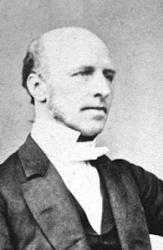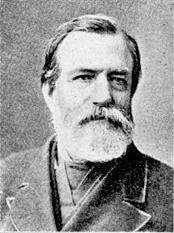1835 - 1912 Hymnal Number: 184 Author of "March on, O soul, with strength" in The New Hymnal for American Youth Coster, George Thomas, was born in 1835 at Chatham, Kent; studied for the Congregational Ministry at New College, London; ordained in 1859 at Newport, Essex, and has since held pastorates at Barnstaple, Hull, South Norwood, and Whitby. He has published (besides many sermons and tracts) Pastors and People, 1869; Allegories, 1878; Lorrin and other Poems, 1859; the Rhyme of St. Peter's Fall, 1871, and Poems and Hymns, 1882. He has also contributed several poems on Scripture characters (a line in which he excels) to The Poet's Bible, and edited, in 1869 Temperance Melodies and Religious Hymns. Of his hymns the following are in common use:—
1. Dost thou bow beneath the burthen. Fellowship with God. This is an imitation of Dr. Neale's "Art thou weary." It is No. 1112 in the 1880 Supplement to the Baptist Psalms and Hymns.
2. From north and south and east and west. Missions.
3. Lord of the sea! afar from land. Sabbath at Sea. Nos. 2 and 3 are in Horder's Congregational Hymns, 1884. [Rev. W. Garrett Horder]
--John Julian, Dictionary of Hymnology (1907)
===============
Coster, G. T., p. 263, i. The following hymns by Mr. Coster have been written and have come into common use since 1892:—
1. Going to the Father. [The Man of Sorrows.] Written in 1899, and published in his Hessle Hymns, 1901, No. 13, in 5 stanzas of 8 lines.
2. Lord God Almighty, in Thy hand. [Praise.] Written in 1897, and published in his Hessle Hymns, 1901, No. 3, in 7 stanzas of 4 lines, and entitled "We praise Thy power."
3. Lord of the gracious sunshine. [Temperance.] Written at the request of the Rev. W. G. Horder for his Hymns Supplemental on Oct. 51893. It is in extensive use in Great Britain and America. In the author'sHessle Hymns, 1901, No. 30, and entitled "A National Foe."
4. March on, 0 Soul, with strength. [Christian Battle Song.] Written in Bedford Park, London, Aug. 3, 1897, and printed in The Evangelical Magazine, Feb., 1898. In the Hessle Hymns, 1901, No. 29, in 6 stanzas of 6 lines, and headed "Battle Song." It is in common use in America, including The Pilgrim Hymnal, 1904, and others.
5. O Friend Divine! with Thee apart. [Fellowship with Christ.] First published in the Evangelical Magazine, Sept., 1900; also in his Hessle Hymns, 1901 No. 25, in 6 stanzas of 4 lines. Included in The Pilgrim Hymnal, 1904.
6. Skill and beauty from Thee live. [Opening of a Sale of Work.] First published in his Hymns and Poems, 1882, and again in his Hessle Hymns, 1901, No. 33, in 3 stanzas of 4 lines.
7. Thou Whose great baptismal hour. [Holy Baptism.] Written in 1892, at the request of W. G. Horder, for the Baptist edition of his Worship Song, and given therein 1895, No. 697; also in the Baptist Church Hymnal, 1900, No. 504, and the author's Hessle Hymns, 1901, No. 19.
8. We join with all in every place. [Holy Communion.] Written in 1891, and first published in Border's Hymns Supplemental, 1894, and the Hessle Hymns, 1901, No. 20, in 3 stanzas of 6 lines, and entitled “United Communion Service."
In addition to the above the following hymns are appearing in forthcoming collections:—
9. Comrades' names are on our banner. [National Hymn] Written at Scarborough, July, 1901, and printed in The Examiner (the weekly organ of the Congregational Churches), May 8, 1902; also in the author's When the Stars Appear, 1903, p. 11, in 6 stanzas of 6 lines, and entitled "Names on Our Banner."
10. King of the City Splendid. [National Hymn) Written at Bedford Park, London, Aug. 18, 1897, and printed in The Independent (Congregational weekly), Jan. 27, 1898. In his Hessle Hymns, 1901, No. 40, in 10 stanzas of 6 lines, and entitled "Prayer for our Cities."
Concerning the three hymns noted on p. 263, i., the author says :—
1. Dost thou bow beneath the burden! "It was
written in 1879, and first printed in the Evangelical Magazine, May, 1879." In the Hessle Hymns, 1901, No. 22.
2. From north and south, and east and west. "Originally written in 1864, and first printed in the Evangelical Magazine. In later collections it haft been considerably altered" In its varying forms it is the most widely known of the author's hymns. Authorised text in Hessle Hymns, 1901, No. 26.
3. Lord of the Sea, afar from land. "Written in 1874, and printed in The Christian World magazine, 1879." Included in Hessle Hymns, 1901, No. 31.
Since 1890 Mr. Coster has held the pastorates of Stroud and of Hessle, near Hull. He retired from the active ministry in 1902. His later poetical works include Collected Poems, 1890; Gloria Christi, 189G; Hessle Hymns, 1901; When the Stars appear, 1903; and Beams of Christ's Glory, 1904. In these works Mr. Coster has maintained his reputation as a writer of hymns.
--John Julian, Dictionary of Hymnology, New Supplement (1907)
George T. Coster


 My Starred Hymns
My Starred Hymns







